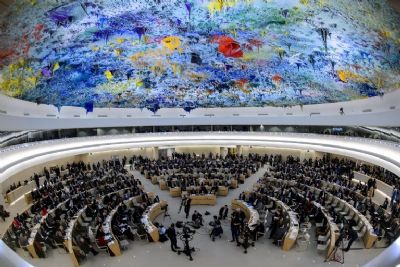Here is part of the human rights records of vice-presidents Albania, Kazakhstan and Paraguay as set out in the latest US State Department reports:
In Albania
- "Security forces committed human rights abuses. The most significant human rights problems were: pervasive corruption in all branches of government, and particularly within the judicial system; the stalling of the reform agenda, in particular the fight against corruption, as the political parties focused on the June elections; and domestic violence and discrimination against women. Other human rights problems included police beating and other mistreatment of suspects during detention and interrogation, sometimes to elicit confessions; substandard prison conditions; an inefficient judiciary subject to political pressure and corruption; and child abuse...Marginalization and abuse of the Romani and Balkan Egyptian communities were serious problems...Discrimination on the basis of sexual orientation and gender identity was a problem...Incidents of societal killings, including both "blood feud" and revenge killings, occurred during the year...Victims rarely reported spousal abuse, and officials did not prosecute spousal rape. The concept of spousal rape was not well established, and authorities and the public often did not consider it a crime..."
- "The most significant human rights problems were severe limits on citizens' rights to change their government; restrictions on freedom of speech, press, assembly, religion, and association; and lack of an independent judiciary and due process, especially in dealing with pervasive corruption and abuses by law enforcement and judicial officials... Other reported abuses included: arbitrary or unlawful killings; military hazing that led to deaths; detainee and prisoner torture and other abuse; harsh and sometimes life threatening prison conditions; arbitrary arrest and detention; infringements on citizens' privacy rights; prohibitive political party registration requirements; restrictions on the activities of nongovernmental organizations (NGOs)...
Violence against women, including domestic violence, was a problem...NGOs reported that women often withdrew their complaints because of economic insecurity...When domestic violence cases came to trial, the charge was most often light battery... the practice of kidnapping women and girls for forced marriage continued in some remote areas...A person who voluntarily releases an abductee is absolved of criminal responsibility if in this action he/she did not commit another offense. Because of this law, a typical bride kidnapper is not necessarily held criminally responsible for the act. Cases were typically not pursued...Law enforcement agencies often advised abductees to sort their situation out themselves... [M]aking a complaint to the police could be a very bureaucratic process and often subjected families and victims to humiliation...Sexual harassment remained a problem."
- "Security forces committed human rights abuses. The principal human rights problems were impunity in the judicial sector, together with lengthy pretrial detention and trial delays, harsh and at times life-threatening prison conditions, and police involvement in criminal activities, including unlawful killings by persons associated with the security forces. Other human rights problems included the killing and intimidation of journalists by organized-crime groups, corruption, discrimination, and violence in the society and in government against women and indigenous persons, persons with disabilities, and lesbian, gay, bisexual, and transgender (LGBT) persons, and trafficking in persons. Problems with child labor and violations of worker rights occurred often...[R]ape continued to be a significant and pervasive problem, including reports of minors who were drugged and gang raped...Domestic violence was common, and thousands of women received treatment for injuries sustained in domestic altercations."

